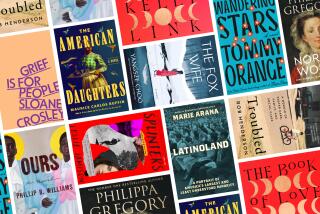Rebecca Carroll’s Great American Novel: ‘Sula’ by Toni Morrison
- Share via
Toni Morrison once said: “We die. That may be the meaning of life. But we do language. That may be the measure of our lives.” Nowhere is this more vividly true than in the pages of “Sula,” Morrison’s 1973 novel about the stunningly Orphic friendship of two black girls growing up in a small Ohio town over the span of 20-plus years starting in the early 1900s. As a follow-up to her impossibly brilliant debut novel, “The Bluest Eye,” “Sula” somehow manages to be not only as extraordinary but also as sublime.
When it comes to the criteria for a Great American Novel, there is, of course, the matter of effective storytelling. But there is also the very significant task of harvesting truly transformative writing. In “Sula,” Morrison rewrites the very act of writing — making it seem like a new phenomenon, a secret blasted open and gifted to you in sentences that breathe like human beings: “Then summer came. A summer limp with the weight of blossomed things. Heavy sunflowers weeping over fences; iris curling and browning at the edges far away from their purple hearts; ears of corn letting their auburn hair wind down to their stalks.”
In ‘Sula,’ Toni Morrison rewrites the very act of writing — making it seem like a new phenomenon, a secret blasted open and gifted to you.
— Rebecca Carroll
I was probably in my early 20s the first time I read “Sula.” At the time, I was still finding my voice as a writer, but even more so trying to connect with the blackness of my skin, the kinfolk of my imagined memories and the cognitive dissonance of my own cultural narrative. In many ways, it feels like I walked into the pages of “Sula” all those years ago now and never walked out. And in rereading it again recently, I was reminded that in my best incarnation, I remain there — in this deeply textured, viciously agile world where words are simultaneously smashed like dishes against the floor and coddled like small children; unrelenting and spoiled, bold and precious.
Our Critics at Large pick their Great American Novels
What I find most striking, though, is how much permission is given in this novel — intellectual, emotional, sexual — so much black pleasure and gratification granted, such an endless supply of freedom, all without ever seeming unwise or indifferent. Nel Wright and Sula Peace meet as young girls, both only children, both unusual and deeply smart, and the two immediately start up an intense friendship as if they’ve known each other all along: “Because each had discovered years before that they were neither white nor male, and that all freedom and triumph was forbidden to them, they had set about creating something else to be.” Both had disengaged mothers and absent fathers, and so, writes Morrison, “they found in each other’s eyes the intimacy they were looking for.”
What I find most striking is how much permission is given in this novel — intellectual, emotional, sexual — so much black pleasure and gratification granted
— Rebecca Carroll
Their friendship grows and narrows, weeps and wanes, dies and remembers, asks for everything and hopes for nothing. It exists to represent far more than just their friendship, which is plenty meaningful on its own: “In the safe harbor of each other’s company they could afford to abandon the ways of other people and concentrate on their own perception of things.” It is the America that black people would have created had we not had to build it on our backs, one that dies for its meaning, but does language for its measure.
Carroll is one of our Critics at Large
More to Read
Sign up for our Book Club newsletter
Get the latest news, events and more from the Los Angeles Times Book Club, and help us get L.A. reading and talking.
You may occasionally receive promotional content from the Los Angeles Times.







